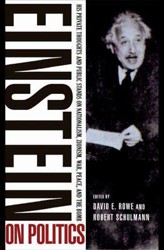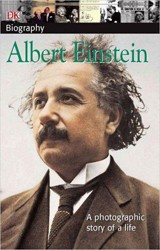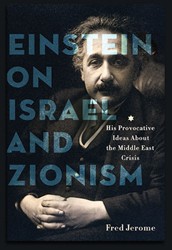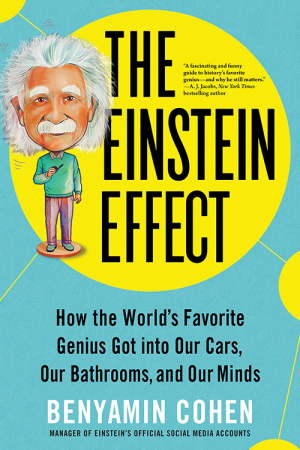This is the story of a brilliant man who began life regarding his Jewishness as an obstacle and later embraced it as fully as he could. The book covers the scientist’s early years, before he left Europe in 1933 for Princeton, New Jersey. Archivist, curator, and editor of Einstein sources, the author delivers a wealth of down-to-earth, human material about his famous subject.
Raised as a Jew in Munich, Einstein emigrated to Switzerland to escape late nineteenth century German anti-Semitism, took Swiss citizenship, married a Gentile, then returned to Germany to become an academic star. He then divorced his wife and rejected their two sickly (and therefore unproductive) sons as “not valuable.” Though unloved, this first family was always well supported.
As a religion, Judaism had no meaning for Einstein. But he married Elsa, a cousin, and began to find Jewish friends more “comfortable.” “Blood is thicker than water,” he said, and as he matured he joined efforts to help Jews suffering persecution in Eastern Europe
After World War I, Einstein yielded to attempts to interest him in the growing Zionist movement and also in efforts to found a Hebrew University in Palestine. This institution would be staffed by refugee Jewish professors and attended by Jewish students who were refused admission elsewhere. Academic standards would be of the highest. Einstein was by then so eminent that putting his name on an appeal constituted a major coup.
Although he was showcased in a Zionist American fundraising tour, Einstein was only lukewarm about efforts to establish a Jewish homeland. To the despair of his sponsors, his heart belonged to the Jerusalem University.
In 1923, during the early British Mandate, Einstein made a wildly acclaimed tour of Palestine and lectured at the site of the university-to-be. Of the envisioned nation he predicted, “nothing will come of it as an agricultural community (the Zionist dream).” But he admired the Jewish commercial dynamism of the cities.
As his beloved university took shape, the executive director, Judah Magnes, a prominent New York Reform rabbi, began taking it in a direction that horrified their famous sponsor. Instead of the German research institute Einstein and other European donors and academics expected, it was becoming a highly structured American-style school. Zionists knew that a research orientation would send young people out of the country in droves to get their BA’s. Einstein wanted to resign but having won the Nobel Prize and published the theory of relativity, he was too important to withdraw publicly. The book ends with the issue still unresolved — what was the proper function of a university: to sponsor research, or to teach?
Busy readers will have to skim and flip. Students and researchers will find treasures here.





